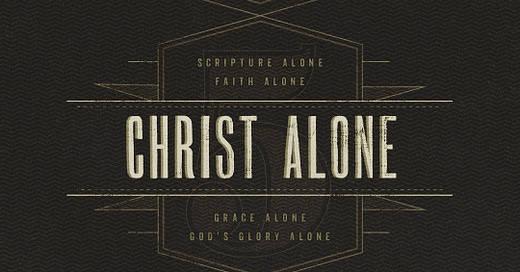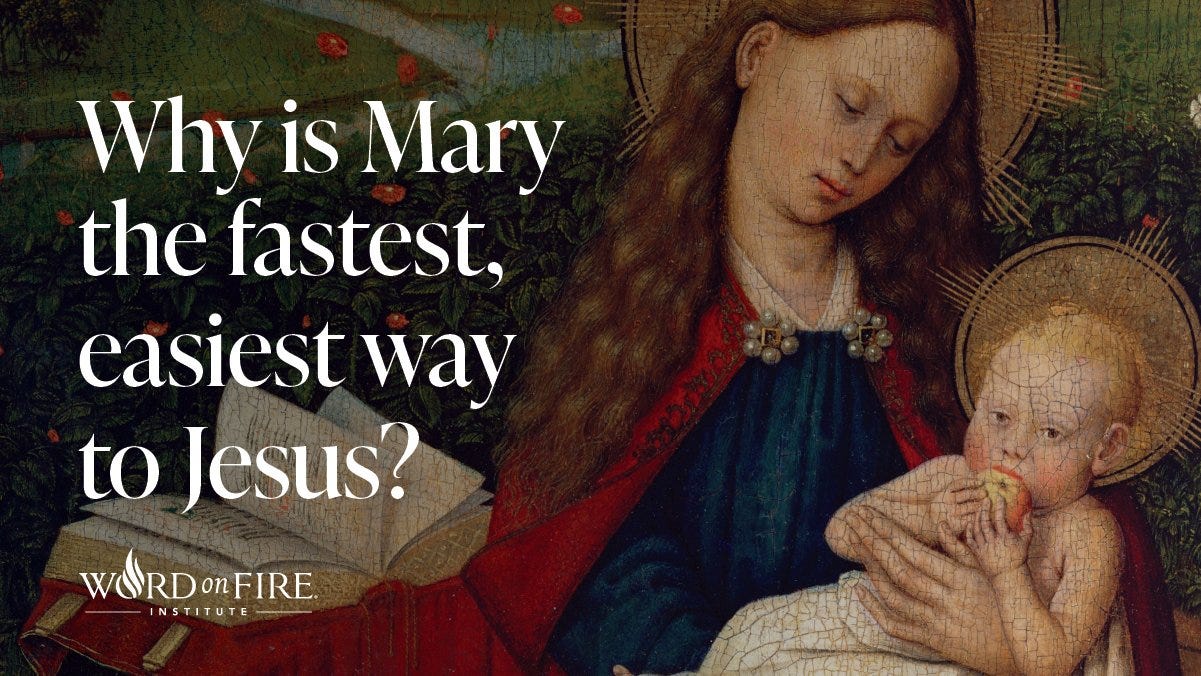Among the Five Solas of the Reformation, Solus Christus is the most foundational. Without Him, none of the others hold. To proclaim “Christ alone” is a decisive theological claim: that Jesus Christ is the sole mediator between God and humanity, the only source of salvation, and the rightful head of His Church.
Yet, this declaration, which seems like such an obvious statement, was one of the Reformers’ most urgent corrections. What was happening in the late medieval Church that made it essential to reaffirm Christ as the center and source of salvation?
Why Solus Christus
It may seem strange that the Reformers had to argue for something as basic as “Christ alone.” However, in the late medieval Church’s religious landscape, Christ’s role as the sole mediator between God and humanity had been obscured by centuries of doctrinal and practical developments. While the Church never formally denied Christ’s central place in salvation, its teachings and structures often functionally displaced Him. The result was a deeply confused understanding of how grace was accessed, who could intercede, and what role Christ actually played in the believer’s life.
Grace was understood to flow through the Church’s rituals. These sacraments could only be administered by the priesthood, which functioned as an indispensable intermediary between God and the laity. The faithful were taught to depend on the Church’s system of confession, absolution, and participation in the Mass for their spiritual standing. Christ was still present in a sense, but mediated through layers of ecclesiastical authority.
Reformers recognized the critical need to return to the biblical proclamation of Christ as the sole mediator and redeemer. They emphasized the once-for-all sufficiency of Christ’s atoning death and rejected the idea that the Mass was a re-presentation of that sacrifice. There arose a strong emphasis on the union between the believer and Christ made possible not by the Church but by grace through faith.
William Tyndale, in particular, whose English Bible translation shaped Protestant thought in the English-speaking world, wrote passionately against the priestly system that obscured direct access to Christ. He argued that every believer, through the Scriptures, could know and respond to Christ personally without clerical interference.
The Reformers were rightly united in their protest against the notion that grace must come through human channels. They saw clearly that the heart of the gospel was being lost under the weight of ecclesiastical ritual, saintly devotion, and sacramental mediation. Their goal was not to diminish the Church, but to restore its foundation on Christ.
As Calvin wrote:
“We see that our whole salvation and all its parts are comprehended in Christ. We should therefore take care not to derive the least portion of it from anywhere else.”
(Institutes 2.16.19)
Christ’s Exclusive Role In Scripture
While Solus Christus emerged in response to medieval distortions, its authority does not rest in the Reformers themselves. The doctrine stands strong because it reflects the clear teaching of Scripture. The New Testament presents Christ as the unique and sufficient mediator through whom God’s grace is revealed, received, and completed.
Jesus’ words are unmistakable: “I am the way, and the truth, and the life. No one comes to the Father except through me.” This is not a claim of partial or shared authority; it’s a claim of exclusivity. Jesus does not point the way to God; He is the way. Any system that directs people to another intermediary—whether saint, sacrament, or spiritual leader—undermines the plain reading of this statement. Access to the Father is found in Christ alone.
When Peter proclaimed the gospel before the Sanhedrin, he made the apostolic conviction clear: “There is salvation in no one else, for there is no other name under heaven given among mortals by which we must be saved” (Acts 4:12). Salvation is not tied to a church, a rite, or a holy person but to the person and name of Jesus Christ. This exclusive claim stands at the heart of the Christian faith, and to dilute it is to depart from the gospel itself.
Paul’s hymn to Christ in Colossians 1 is a sweeping declaration of His unique identity and authority: “He is the image of the invisible God… in him all things hold together… he is the head of the body, the church… he is the beginning, the firstborn from the dead, so that he might come to have first place in everything” (Col 1:15–18). There is no room for divided allegiance here. Christ is not merely part of God’s redemptive plan; He is the fullness of God’s presence and purpose made visible. All things—creation, reconciliation, and the church itself—find their source and goal in Him.
Nowhere is the singular sufficiency of Christ more clearly articulated than in the letter to the Hebrews. The writer contrasts the repeated sacrifices of the old covenant priests with the once-for-all offering of Christ: “But when Christ had offered for all time a single sacrifice for sins, he sat down at the right hand of God” (Heb 10:12).
Jesus’ priesthood is totally unique. He is the High Priest who “holds his priesthood permanently, because he continues forever” (Heb 7:24). His intercession is perfect and unending, and it’s not through temple rituals but “by the power of an indestructible life” (Heb 7:16). The tabernacle, the sacrifices, and the Levitical priesthood all pointed forward to Christ. Now that He has come, there is no more need for earthly mediation.
The biblical witness is consistent: Christ does not share His mediating role; He fulfills it completely. Solus Christus is not a Reformation slogan invented to oppose tradition; rather, it is a theological principle that emphasizes the singular importance of Christ. It is a biblical doctrine that the Reformers intentionally focused on to correct the departure from the teachings of the apostles.
Why Solus Christus Still Matters Today
It would be easy to think that Solus Christus is a historical concern, settled in the 1500s and no longer in need of defense. However, the very issues that necessitated the slogan during the Reformation still persist, though they often disguise themselves in different forms. The temptation to add to Christ, to replace Him with something more manageable, or to redefine Him on our own terms is as strong today as it ever was.
Catholicism’s Enduring Problem
The Catholic Church has not moved away from the theology that prompted the concerns of the Reformers. It still teaches that grace is dispensed through the sacraments and that priests serve as mediators of that grace. Although Christ is acknowledged as the source of salvation, the believer is taught that access to Him depends on ecclesiastical rituals, confession to a priest, and participation in the Eucharist, also known as the Mass.
Even more prominently, Marian devotion remains central in Catholic life. The Church teaches that Mary intercedes for the faithful, and in practice, she is often spoken of as a co-redeemer or spiritual mother whose help is necessary to approach Christ. The Word on Fire Institute’s program on Mary recently advertised itself with the slogan: “Why is Mary the fastest way to Jesus?” See for yourself:
Such a statement reveals the heart of the problem. Scripture teaches that believers already have direct access to Christ through faith. To insert another figure between the believer and Jesus—even one as honored as Mary—is to deny the very meaning of Solus Christus.
Shallow Evangelical Theology
In many Evangelical churches, Solus Christus is affirmed in theory but denied in practice. Jesus is often presented as the one who saves you but not as the one who shapes your life. His Lordship is sidelined in favor of personal inspiration. The gospel is reduced to a one-time prayer and a minimal confession that carries little weight after conversion.
This result is hollow faith where Christ is little more than a means to avoid judgment. He is referenced but not followed. He certainly isn’t obeyed or revered. When faith becomes little more than private affirmation, Christ becomes peripheral. Solus Christus reminds the Church that Jesus is not just our Savior; He is our King, our Judge, our Teacher, and the one to whom we owe everything.
Cultural and Progressive Confusion
Outside the Church, Christ is often redefined to fit modern ideals. In progressive theology, Jesus is praised for His compassion, inclusiveness, and resistance to power. Yet His exclusivity, commands, and call to repentance are quietly removed. In secular culture, He is admired as a teacher or pictured as an anarchist but stripped of divinity and any claim to absolute truth.
This reimagined Christ may be easier to promote, but it is not the Christ of Scripture. The Jesus of the New Testament is not one voice among many. He is the one “through whom all things were made” (John 1:3) and the only one “by whom we must be saved” (Acts 4:12). To lose this Jesus is to lose the power of the gospel itself.
Christ Alone
In a religious culture saturated with substitutes for Christ—whether rituals, personalities, experiences, or false ideologies—the Church must once again be clear about its foundation. We are not saved by systems; we are not transformed by saints or sacraments; we are not brought near to God through clergy or culture. We are saved by the risen Lord, Jesus Christ, who lives and reigns and intercedes for His people.
The Churches of Christ have long rejected human priesthoods, sacramental hierarchies, and inherited tradition in favor of returning to the simple authority of Christ and His word. Our plea has always been to restore, not to innovate.
At the heart of that plea is the conviction that Christ is sufficient. He is the head of the church, the source of grace, the one to whom we answer and in whom we find rest.
Solus Christus also gives us a bridge; many of our neighbors in Evangelical, Catholic, and mainline Protestant traditions speak of Christ but define Him differently or even place Him alongside other mediators. Understanding how the Reformers approached this issue equips us to listen more carefully, teach more clearly, and proclaim more faithfully that Christ is not just important; He is everything.
Let the Church never forget: we do not point to a system, a tradition, or a movement. We point to Jesus the Christ.





